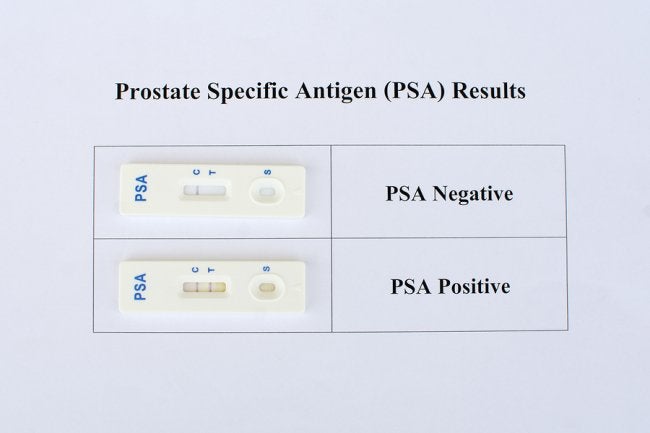-
What Does It Mean to Have an Elevated PSA?

Prostate-specific antigen, or PSA, is a protein that is made by the prostate and present in your blood. Your primary care physician or urologist may perform a PSA test as a routine part of your preventative health care regime. Abnormal levels can indicate a health problem, such as prostate cancer.
If elevated PSA levels are detected during a blood test, your urologist may recommend further prostate cancer screening tests to determine if cancer could be the cause. It is important to note that elevated PSA levels do not necessarily mean that cancer is present, and normal PSA levels do not mean that no cancer exists. It is one tool in the cancer screening process that your urologist can use to detect the disease in early stages, when cancer treatment is most effective.
Your urologist at Urology Associates, P.C. will review all of your lab results with you, so you understand what things like elevated PSA levels mean for your overall health. To schedule an appointment for prostate cancer screenings in Nashville , please call (855) 901-1338.
-
A Look at Stress Urinary Incontinence
Urologists often diagnose stress urinary incontinence in women. It occurs when small amounts of urine leak at inappropriate times. Incontinence can occur when a person is sneezing, laughing, coughing, or engaging in any other activities that exert pressure on the bladder.
Watch this animation to learn more about why stress urinary incontinence occurs. It explains the basic anatomy of the area, such as the functions of the sphincters and pelvic floor muscles. In women, stress urinary incontinence is often the result of the weakening of the pelvic floor muscles after pregnancy and childbirth.
Effective treatments for incontinence are available in Tennessee. Contact Urology Associates, P.C. at (855) 901-1338 to request an appointment with a urologist.
-
Treating Recurrent Vaginal Yeast Infections

Women typically treat vaginal yeast infections with over-the-counter (OTC) products, assuming that there is no need to visit a urologist. However, women who develop recurrent yeast infections would be wise to see a urology specialist instead of continuing to rely on OTC suppositories. This is because it’s possible for these patients to actually have vestibulitis, which mimics the symptoms of vaginal yeast infections and may be caused by repeated yeast infections.
Vestibulitis is a chronic inflammatory problem that causes symptoms like burning, irritation, the frequent urge to urinate, and pain that occurs with pelvic pressure or vaginal entry. The treatment for this condition may involve medicated topical applications and lifestyle modifications, such as avoiding the exposure of chemical irritants. For example, women may be advised to avoid OTC vaginal products, scented laundry detergent, and douching.
At Urology Associates, P.C., women will find comprehensive and compassionate sexual health care in Nashville. Call us at (855) 901-1338 today or visit us online to learn about the conditions we treat , including sexual dysfunction.
-
Get the Facts About Chronic Testicular Pain

Thousands of men visit a urologist because of testicular pain. In some cases, the pain is caused by a debilitating condition called chronic testicular pain, or CTP. CTP ranges from mild to severe and can interfere with every day activities. If you believe you could be suffering from CTP, your urologist can provide treatments to ease your symptoms and help you enjoy a better quality of life. Here is what you need to know about this painful condition.
CTP may be constant or intermittent.
The discomfort associated with CTP may be constant in some men, while others have pain that comes and goes. The distinguishing factor between CTP and other types of testicular pain is that CTP persists for three months or more. Some men may have a sudden onset of pain that is eventually diagnosed as CTP, while others have pain that develops gradually.
Symptoms of CTP can vary.
Some men with CTP have symptoms all the time, but other men only have discomfort during activities. The pain can feel like aching and pressure or burning and throbbing and may also spread to the lower back and upper thighs. The pain can appear in one or both testicles and may switch from side to side. In some men, the pain is accompanied by swelling, fever, painful urination, painful intercourse or ejaculation, and bloody urine. Nausea and vomiting are also possible.
Several treatment options are available.
If you are diagnosed with CTP, the first thing you urologist will do is try to pinpoint the cause. Trauma, infections, hernias, cysts, and torsion are all potential causes of CTP, though in some cases, the cause is unknown. If your urologist does find a cause, treating the underlying issue can often resolve the CTP. Medications and surgery may be necessary to treat CTP.
Visit Urology Associates, P.C. for diagnosis and treatment any time you experience testicular pain. Our doctors provide comprehensive care for CTP , sexual health issues including erectile dysfunction, and testicular cancer in Nashville. To make your appointment, call (855) 901-1338.
Recent Posts
categories
- Uncategorized
- Bladder Cancer
- Women's Sexual Health
- MonaLisa Touch
- Urology
- Urologist
- Erectile Dysfunction
- Kidney Cancer
- Incontinence
- Prostate
- MonaLisa Touch Laser Treatment
- Kidney Stones
- Urinary Tract Infections
- Event
- Sexual Dysfunction
- Testicular Cancer
- Prostate Cancer
- Urology Surgery Center
- urinary incontinence
- vaginismus
- noncoital pain disorder
- Hypoactive Sexual Desire Disorder
- Infographic
- provenge
- Xofigo
- robotic surgery
- hormone replacement
- diabetes
- renal cell carcinoma
- pelvic pain
- hematuria
- sexual health
- chronic testicular pain
- premature ejaculation
- Men's Health Clinic
- Dr. Melvin Seard
- Interstitial Cystitis
- vasectomy
- overactive bladder
- vaginal atrophy
- nocturia
- bladder infections
- urethral strictures
- Acute Epididymitis
- low sex drive
- circumcision
- pelvic floor dysfunction
- Peyronie's Disease
- prostatitis
- female sexual dysfunction
- varicocele
- difficult urination
- low libido
- PSA levels
- male fertility
- penile prosthesis
- prostatic intraepithelial neoplasia
- male infertility
- estrogen levels
- nurse navigator
- stress urinary incontinence
- vaginal yeast infection
- elevated psa
- painful sex
- adult circumcision
- epididymitis
- OAB
- kidney infection
- penile cancer
- pelvic organ prolapse
- Vasectomy Reversal
- bone health
- cystectomies
- clinical trials
- bloody urine
- Advanced Therapeutic Center
- WISH MedSpa
- neurogenic bladder
- WISH Team
- prostate biopsies
- BPH
- fecal incontinence
- lithotripsy
- osteoporosis
- kidney cysts
